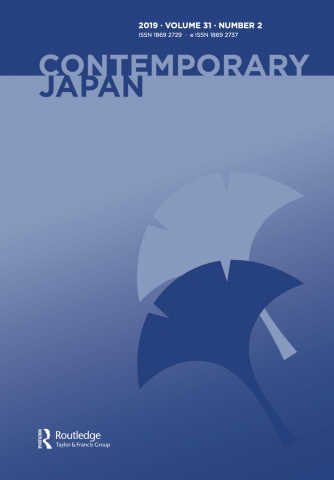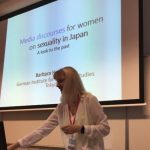Veranstaltungen und Aktivitäten
Working mums have it tough in Japan – creating Instagram-worthy, healthy lunches is one of many pressures they say they face
Barbara Holthus gab der BBC ein Interview, in welchem über die Bedeutung der von Müttern zubereiteten Bento Boxen gesprochen wurde.
User-driven Innovation in Health- & Elderly Care in Japan
Japan is enthusiastic about developing and applying innovative technology in the context of health- and elderly care. Research and development in care robotics, sensor technology (mimamori sensā), or ICT applications are widely promoted by the government. Despite these manifold efforts and activities, many devices fall short of meeting the needs expressed by users. Therefore, this DIJ Forum raises the question, what is necessary to fulfil user’s needs in healthcare? What needs to be done to improve user acceptance and usability of technology regarding innovation in health- and elderly care? Our two speakers are best suited to discuss these questions from a cross-disciplinary perspective.
Speaker:
Sarah Cosentino, Waseda University
Nobu Ishiguro, Osaka University
Citizen Science in the Digital Age
– Engaging civil society in social science and humanities research –

The progress of digital technology creates new opportunities in all areas of the civil soci-ety. The expansion of citizen science is one example. With citizens taking part in re-search activities, their understanding about science deepens. At the same time, civic engagement can support and advance scientific research. Nevertheless, compared to the natural sciences, practices of citizen science in the social sciences and the humanities (SSH) are still rare.
Combining experiences and insights by leading experts from Japan and abroad, our conference will take a closer look at the opportunities and challenges for citizen science in SSH. Where and how can civil society get engaged? What are the potential benefits? What risks need to be addressed? How can respective collaborations be initiated and coordinated? How will this effect both society and research in SSH?
The Digital Transformation – Implications for the Social Sciences and the Humanities

The two-day academic workshop – jointly organized by the German Institute for Japanese Studies (DIJ), the German Centre for Research and Innovation Tokyo (DWIH Tokyo) and the Nippon Institute for Research Advancement (NIRA) – discussed the impact of DT on the social sciences and humanities with regard to three subtopics.
It first addressed the impact of DT for research questions and research design. What questions do we need to ask and how can we make best use of DT in the way we conduct research? Second, it elaborated the possible implications of DT with regard to the dissemination of research outcomes. Finally, it considered how DT might change the organization and institutional set-up of academia. Who will conduct research? Where will it be conducted? Will disciplinary boundaries remain relevant?
Contemporary Japan, Volume 31, Issue 2
 This issue starts with a Special Section on “Emotions and Affect in Studies on Contemporary Japan,” featuring original research articles on cutting edge topics including the dynamics of conversion to right-wing ideologies, the emotional toll of providing care for left-wing political prisoners, and the struggles in “coming out” for families of LGB individuals, prefaced with an introduction by Barbara Holthus grounding the studies in the sociology of emotion.
This issue starts with a Special Section on “Emotions and Affect in Studies on Contemporary Japan,” featuring original research articles on cutting edge topics including the dynamics of conversion to right-wing ideologies, the emotional toll of providing care for left-wing political prisoners, and the struggles in “coming out” for families of LGB individuals, prefaced with an introduction by Barbara Holthus grounding the studies in the sociology of emotion.
We also have three original articles covering topics that range from an analysis of historical memory in Yū Miri’s JR Ueno Station Park Exit, the shifting identity narratives of the Tokyo 2016 and Tokyo 2020 Olympic bids, and how katakana is used by discourse producers to communicate nuanced perspectives.
Das DIJ auf der diesjährigen ICAS 11
Bei der diesjährigen ICAS 11 Konferenz in Leiden war das DIJ mit drei Vorträgen präsent von Barbara Holthus, Hanno Jentzsch und Nora Kottmann. Darüberhinaus hatte die Max Weber Stiftung einen Informationsstand, auf dem das DIJ auch mit diversen Publikationen und Informationen vertreten war.
Für einen ausführlichen Bericht dazu, siehe hier.
Wielding Toxic Discourse: Insanity in the Nuclear Narratives of Chernobyl and Fukushima
Environmental scholar Lawrence Buell defined toxic discourse as a mode of writing that expresses “anxiety arising from a perceived threat of environmental hazard“ (2003, 30-31). Fictional works from the Chernobyl and Fukushima nuclear accidents feature characters who appear to be mentally unstable because of this anxiety. Rather than their insanity discrediting them in the eyes of the nuclear industry, this presentation draws inspiration from Buell to consider how insanity can be used by victims of nuclear disasters to claim authority through toxic discourse by crafting narratives of resistance. One of the most controversial images stemming from nuclear disasters is of people who remain in highly irradiated areas unfit for human habitation. In novels by Kimura Yūsuke (Sacred Cesium Ground and Isa’s Deluge) and Alina Bronsky (Baba Dunja’s Last Love), the so-called insanity of these characters allows them to comment critically on the postdisaster situation, specifically the evaluation of risk and the bankruptcy of credibility. They provide insightful voices of resistance to the narratives of containment and safety perpetuated by the government and nuclear industry. The presentation ends with a consideration of actual residents in contaminated zones in Kamanaka Hitomi’s documentary Little Voices from Fukushima.
Speaker:
Rachel DiNitto, University of Oregon
The Politics of Migration in Japan

Over the last ten years the reported number of migrant workers in Japan has more than tripled, reaching almost 1.5 million in 2018. This unprecedented high number of foreigners migrating to work and live in Japan requires policy makers and academics to understand what is happening, why and how. We will take up the issue from the perspective of political science.
What do political parties have to say about the issue? What are their policy proposals, who is pushing them, and how high does immigration rank on the respective political agendas?











 Open Access
Open Access 
